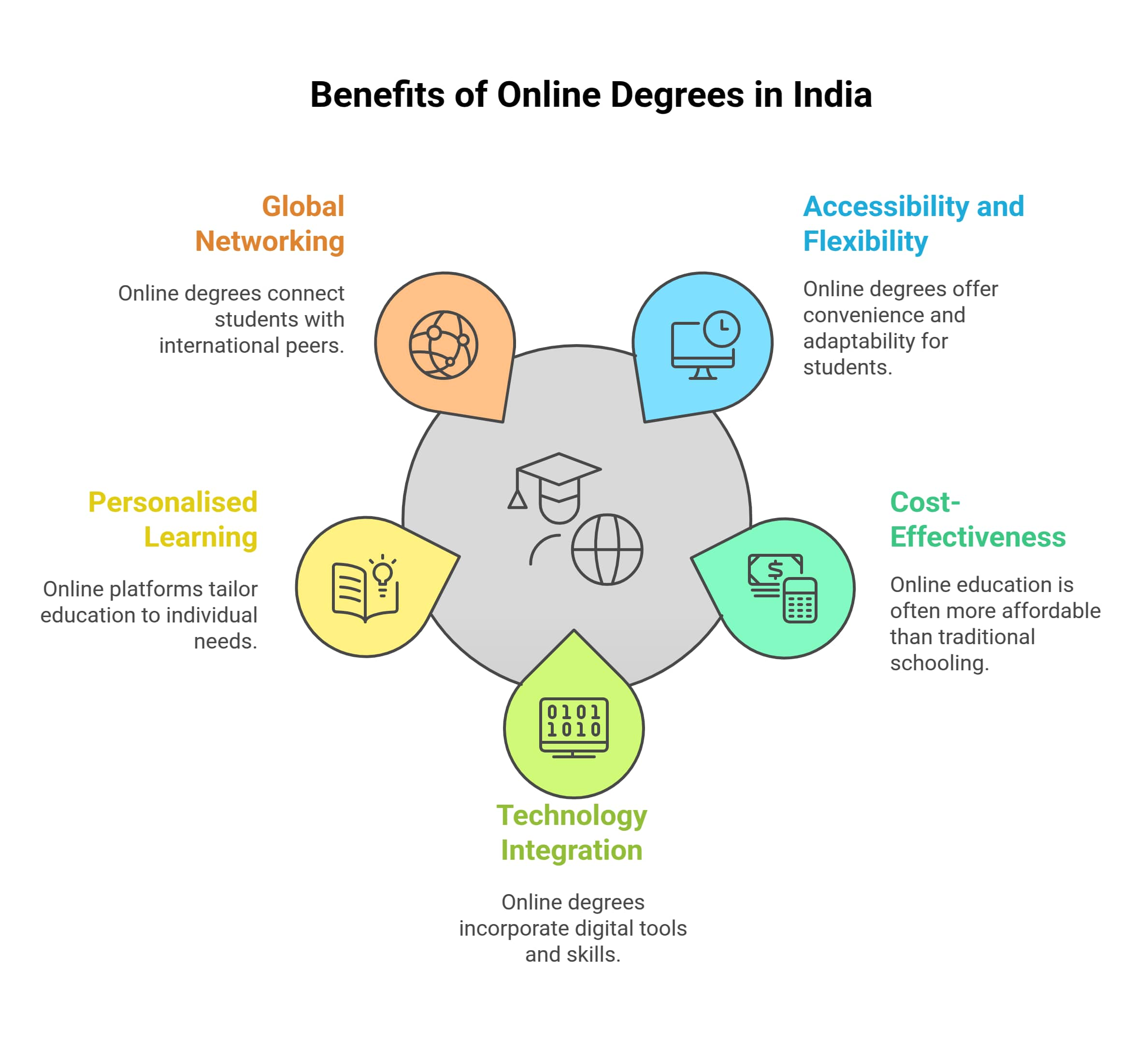Is an Online Degree Valid in India?
According to NACE Job Outlook 2024 survey, 87.4 per cent of employers hire new graduates with online degrees. With the growing acceptance of online degree programmes, many students question "Is an online degree valid in India?".
This Story also Contains
- Is an Online Degree Valid as a Regular Degree?
- Factors To Consider For an Online Degree is Valid or Not
- UGC Guidelines for Online Programs
- Types of UGC-Approved Online Degree Courses in India
- Online Degree Courses In India: Eligibility Criteria

Understanding the accreditation and validity of online degree courses is essential for making informed academic choices. Over 95 UGC-approved universities in India provide online degree courses at undergraduate and postgraduate levels. Students are provided online degree courses in a variety of disciplines, such as arts, commerce, management, and computer applications. Before enrolling for any online degree, students must ensure that they verify the UGC status of the chosen college and meet the eligibility and admission criteria of their college.
Is an Online Degree Valid as a Regular Degree?
An online degree is recognised by the University Grants Commission (UGC), making it valid as a regular, on-campus degree. UGC-approved online degree courses in India ensure that they meet high quality education and industry standards. Online degree courses provide learners with an added advantage, enhancing the skills and employability of students.
Several top online universities also collaborate with industry experts to offer placement assistance with industry webinars to students, ensuring they are well prepared for evolving job market demands. It also becomes important for students to evaluate course content, faculty expertise, and teaching methods to ensure quality education.
Students must choose the online programme that align with their career goals, enabling them to gain the knowledge and skills needed to pursue their desired careers. Considering these factors helps students choose the right online degree from top universities for professional growth.
Also Read: Can You Really Become an Engineer Online? The Truth About Online BTech
Factors To Consider For an Online Degree is Valid or Not
With the rise of digital learning, online degree courses in India have become a popular choice for students and working professionals seeking flexible, accessible, and affordable education options. The following points highlight 'is online degree valid in India':
Accreditation: Aspiring candidates must verify that the institution they have chosen for their online degree courses is accredited by a recognised authority such as UGC or AICTE. Accredited online degree courses are more likely to hold value in the job market and are respected by employers. Thus, it is important to check the accreditation status of the online degree programme before applying.
Course Curriculum: Online degrees have the same syllabus as regular degree programmes. The coursework includes e-learning materials, case studies, experiential learning, assignments, and projects. Additionally, students enroled in an online degree course need to take quizzes, and tests and appear for semester exams, such as in a traditional classroom.
Course Content and Quality Education: Online degree courses are designed and taught by expert faculty. They use various teaching methodologies to deliver online courses, such as multimedia elements – audio, video, animation, case studies and assignments, and collaborative projects. This significantly enhances the learning experience of students.
UGC Guidelines for Online Programs
As per UGC guidelines, any higher educational institution is eligible to offer online programmes, if they
- Have been existence for at least five years
- Must be accredited by NAAC with minimum score of 3.26 on a 4-point scale
- Should be in the Top 100 in overall category in the National Institutional Ranking Framework (NIRF) for at least two years during the previous three years
The UGC guidelines also state that Central or State or Private Universities do not require prior approval/recommendation/NOC from AICTE for offering of Undergraduate, Postgraduate and Postgraduate Diploma programmes falling under the discipline of Management, Computer Applications and Travel and Tourism.
However, Deemed to be Universities are still required to seek prior approval/recommendation/ NOC of AICTE for offering such programmes in Online mode.
Also Read: How Do Online Degrees Shape the Digital Leaders of Tomorrow?
Types of UGC-Approved Online Degree Courses in India
With greater flexibility and accessibility, online degree courses have become increasingly popular among graduates. These courses are especially beneficial for working professionals, as they need not visit the campus to attend classes in person. They can pursue their online degrees at their own pace.
Several top universities offer UGC-approved online degrees at different levels and in different areas. These online degree courses help learners gain knowledge and skills in their chosen subjects and pursue careers in their desired fields. Mentioned below are the types of online degree courses students can pursue.
Online Bachelor’s Degree
These are undergraduate online programmes with a duration of three years. Students can pursue online UG degree courses in diverse fields of study, including business management, arts, commerce, computer applications, and science.
Online degrees at undergraduate level
| Online UG Degree | Fees |
|---|---|
| Online BBA | Rs 26,400 - Rs 2,40,000 |
| Online BCA | Rs 50,000 - Rs 1,70,000 |
| Online B.Com | Rs 20,000 - Rs 2,00,000 |
| Online B.Sc | Rs 45,000 - Rs 3,50,000 |
| Online BA | Rs 9,000 - Rs 1,66,668 |
Online Master’s Degree
There are various master’s degree programmes offered in online mode that candidates can study while working. These online PG degree courses help students specialise in areas such as management, social sciences, and computer applications.
Online degrees at postgraduate level
| Online PG Degree | Fees |
|---|---|
| Online MBA | Rs 50,000 - Rs 5,00,000 |
| Online MCA | Rs 51,000 - Rs 2,40,000 |
| Online M.Com | Rs 33,000 - Rs 2,00,000 |
| Online M.Sc | Rs 8,000 - Rs 2,80,000 |
| Online MA | Rs 18,000 - Rs 1,70,000 |
Online Degree Courses In India: Eligibility Criteria
The eligibility criteria for online degrees vary depending on the programme level and the institution. The table below highlights the common eligibility criteria for online UG and online PG courses:
| Degree Level | Eligibility Criteria |
|---|---|
| Online UG Degree | 10+2 from a recognised board with minimum 50% marks |
| Online PG Degree | Bachelor’s degree with minimum passing marks from a recognised university. |
Online degree from a UGC-recognised university is valid in India and holds equal value to an on-campus degree for employment. This provides in-depth knowledge and career opportunities. Students should research institutions, verify course credibility, and analyse programme outcomes to ensure their online degree supports their professional growth.
Frequently Asked Questions (FAQs)
Online degrees have the same value as regular degrees, as both mode of degrees are offered by accredited universities.
As online degrees are approved by UGC, degrees obtained in online mode from accredited institutions are recognised by employers. With an online degree, students can enter both the public and private sectors and take their careers to the next level.
Yes, online degrees are valid for government jobs. Students with online degrees can sit for government exams, considering they have gained a degree from universities recognized by UGC or bodies like AICTE or NAAC.
Some of the top universities offering online degree courses in India include Manipal Online, Amity Online, Jain Online, and Dr DY Patil Vidyapeeth Online.
Yes, online degrees are valid for UPSC (Union Public Service Commission) exam as long as it is from a UGC-recognised university.

